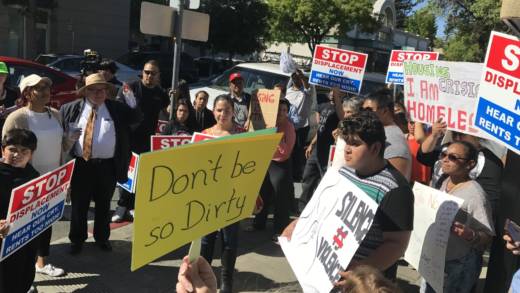"Those really need to go hand in hand," she says, "because if you're not able to evict somebody in the way you want to, you can just raise the rent -- and evict them, essentially, that way."
The people pushed out often can’t afford anything else on the local market. "The pockets of affordability are rapidly disappearing," Zuk says. Those surveyed who did have the resources to move left the county, and even the Bay Area.
The others? The study found that one in three displaced low-income households wound up couch-surfing with family or friends -- or on the streets.
You Don’t Have to be Poor to be Pushed Out
Even if rents have leveled off recently, they’ve leveled off at stratospheric heights, and many landlords are keen to charge what the market will bear.
Saia Fetuu makes a good enough living in landscaping and construction to afford $2,800 for a three-bedroom, single-family home in formerly affordable East Palo Alto. But a couple of months ago, he says, his landlord notified him the rent would rise by $1,050 a month.
"I asked them to negotiate with us," Fetuu says. "You know, we can work something out, something we can afford."
Despite nearly 14 years in the house, Fetuu couldn’t get anywhere. The company, Working Dirt LLC, referred us to their attorney, who did not return our calls. The company has a track record of buying up properties that fall into foreclosure in East Palo Alto.
The Fetuu family’s case has been taken up by Community Legal Services in East Palo Alto, a local nonprofit. The family’s attorney, Jason Tarricone, says, "What they're doing is not necessarily illegal. It’s immoral. And so we are asking them to come to the table and negotiate a fair rent increase."
What the County is Doing
In the meantime, San Mateo County is helping to fund the construction of new affordable units and protect what affordable units still exist. This week, county supervisors voted to boost spending on affordable housing.
Voters recently approved Measure K, a half-cent sales tax extension, to fund the creation and protection of affordable housing, among other municipal needs. On Tuesday, supervisors voted unanimously to spend nearly $44 million of that money over the next two years alone.
At that meeting, Board of Supervisors President Don Horsley acknowledged his office gets "barraged" with emails from people objecting to individual affordable housing projects.
"People don't like change," he said, "but somehow, we have to get that message out, that it's in their self-interest: the interest of having extended families, and having fewer people clog up the roads and highways," traveling from outside the county to work at jobs they no longer live near.
To watch the board meeting about this issue, advance to 1:12:30 below.

